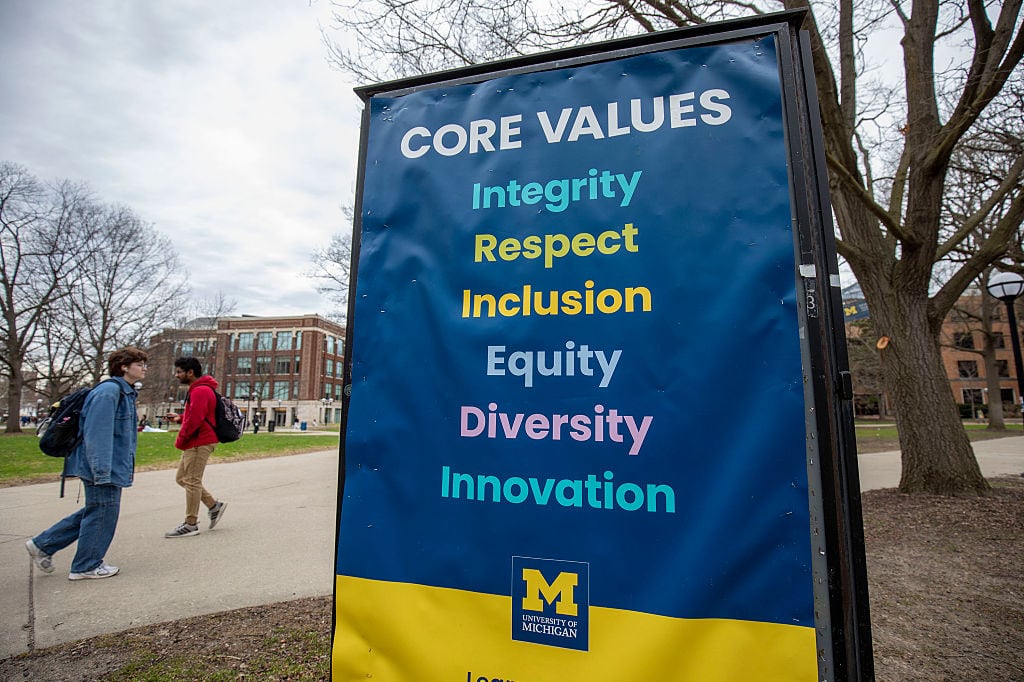Sign up for Chalkbeat’s free weekly newsletter to keep up with how education is changing across the U.S.
A coalition of Democrat-led states is suing the U.S. Department of Education to block its demand that states certify compliance with the Trump administration’s position that many common diversity practices represent illegal discrimination.
The Education Department had given states until Thursday to sign a document certifying they comply with federal anti-discrimination requirements and with the administration’s interpretation of the U.S. Supreme Court’s decision in Students for Fair Admissions v. Harvard. The decision barred the use of race in college admissions, and under President Donald Trump, the Education Department has said that means that a range of common practices associated with diversity, equity, and inclusion, or DEI, could be illegal.
States that don’t comply could lose their federal funding.
The lawsuit filed Friday in U.S. District Court in Massachusetts asks the federal courts to declare the certification requirement null and void and find that states have no duty to comply or investigate whether school districts have complied.
Led by New York Attorney General Letitia James and Illinois Attorney General Kwame Raoul, the lawsuit calls the administration’s interpretation of the law “new, vague, confusing, and incorrect.” The states, which include California, New Jersey, Pennsylvania, Michigan, Colorado, and others, further allege that the Education Department has not clearly described what actions or practices it wants to stop and that the department is pressuring schools to end practices that are actually necessary to protect students’ civil rights. Meanwhile, billions of dollars are at stake.
The lawsuit describes the certification requirement as “subjective and illegal punishment for not acceding to an agenda to eliminate diversity, equity, and inclusion of any kind in schools — even though federal funding and civil rights statutes require public education to be open and welcoming to all regardless of protected characteristics, and inclusive and equitable, especially for those students who have disabilities and need accommodations.”
“The president does not have the authority to rewrite Congress’ allocation of these funds, any more than he can rewrite the clear directives of the Civil Rights Act,” Raoul told reporters on Friday. “This administration has consistently declined to define which diversity, equity, and inclusion practices it finds objectionable, or what the basis of its legal objections are. That’s because it can’t.”
The Education Department did not respond to a request for comment Friday afternoon.
The certification requirement is already on hold after judges issued injunctions in response to earlier lawsuits filed by national teachers unions and civil rights groups. Two of those lawsuits initially were brought to block enforcement of a February Dear Colleague letter in which the Education Department first laid out its new interpretation of civil rights law.
The judges in those cases each reached slightly different conclusions, blocking either the Dear Colleague letter or the certification requirement on different legal grounds, creating a legal patchwork that could be overturned on appeal.
California’s attorney general, Rob Bonta, said the states’ lawsuit differed from others challenging the DEI certifications in a few key ways. The lawsuit spans a broader range of executive actions than those at issue in the other lawsuits. The lawsuit spans multiple jurisdictions. And the states’ legal claims, which involve spending, separation of powers, and appropriations, could end up being stronger, he said.
“We have different claims, that we think are very strong claims, and could be the winning claims,” Bonta said. “We also, as states, have a separate, strong, and unique interest in ensuring that these billions of dollars in Congressionally mandated education funds continue to flow.”
None of the attorneys general from California, Illinois, New York, nor Minnesota said they’d heard anything from the Department of Education since the deadline passed Thursday without their states filing certifications.
“This silence speaks for itself,” James said.
The lawsuit is just one of several that the states have filed seeking to block the Trump administration from pursuing its education agenda. Trump has signed executive orders aiming to dismantle the federal Education Department, expand school choice, and remove “woke” influences from schools. He has repeatedly threatened schools with the loss of federal funding.
Education Secretary Linda McMahon oversaw layoffs and buyouts that reduced the size of the Education Department by half, and she abruptly stopped distribution of remaining COVID relief dollars that states and school districts had been granted permission to spend.
During a Friday court hearing in a separate case contesting mass layoffs at the Education Department, U.S. District Judge Myong J. Joun peppered the government’s lawyer with questions about the administration’s position that the staff reductions should not be subject to a legal challenge.
The states challenging the layoffs say that the Education Department is so diminished it cannot provide basic services, enforce civil rights protections, and distribute funding to school districts — functions that are required by law and can only be undone by Congress.
After the government’s lawyer argued that the plaintiffs were seeking to act “as chief human resources officer for the Department of Education” by forcing the administration to rehire workers, Joun offered an analogy. Imagine walking into a Dunkin’ Donuts and there’s no one behind the counter, the Massachusetts judge said.
“I don’t think the plaintiffs are saying that Dunkin’ Donuts should hire these […] employees back,” said Joun, who has not yet issued a decision. “I think what they’re saying is they want their cup of coffee.”
Chalkbeat reporter Alex Zimmerman contributed reporting.
Erica Meltzer is Chalkbeat’s national editor based in Colorado. Contact Erica at emeltzer@chalkbeat.org.
Kalyn Belsha is a senior national education reporter based in Chicago. Contact her at kbelsha@chalkbeat.org.






